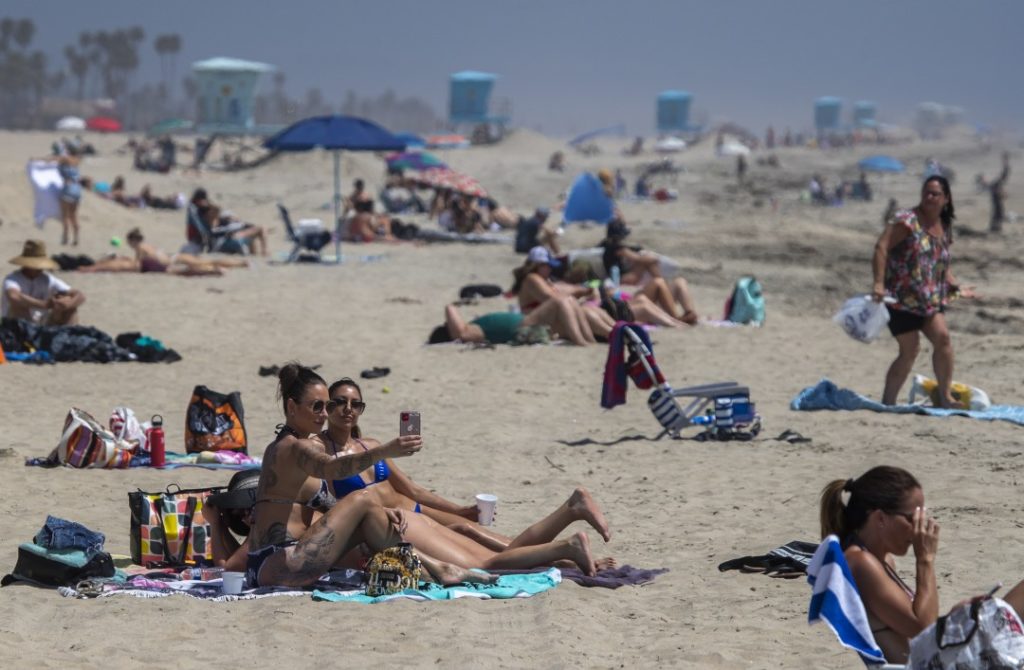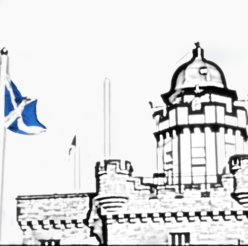Julia Marques da Silva

One of the most nerve-racking activities during the pandemic for me was to walk down to the California beach on a hot day. Signs reading that beaches are closed from 11am to 5pm, with the exception of water sports, should stop the masses coming to escape the heat, but it has become more a coronavirus vacation.
Families do not think twice about setting up their tents and umbrellas to spend the day and ignore the state mandate of wearing a mask at all times outside until they need to get food for their hungry child, or they want to enter a shop to purchase something. I personally have quickly adopted the new reality of wearing a mask at all times outside of my house and have been met with weird side glances and sometimes even sniggering from people passing by. But one of the most bizarre reactions is from those who aren’t wearing one and don’t even acknowledge that you are wearing a mask. They are fine seeing others take the required precautions in the pandemic while they are actively failing to do so themselves. This becomes more absurd because with the masses of the people at the beach, it is exactly how it would have been last summer. A summer without coronavirus.
This perception of a pandemic free summer is created mainly by how people are forgetting that the pandemic is still an issue. By not wearing a mask or failing to follow guidelines, there becomes two different realities between people who are living in the same community. The two different realities of pre-pandemic and post-shelter in place life. While these realities are always intersecting with each outing outside of my home, they aren’t met with any uneasiness or conflict. At least where I live, they both coexist.
But this coexistence of these realities is what makes me, personally, perturbed. The difference in general social norms and the perceived obliviousness of people who do not realize that the pandemic is still happening in real time has created a stark difference in behavior amongst individuals. People are still able to find moral harmony amongst others even in the extreme circumstances that we see today.
Their sense of comfort in public without following any guidelines reflects on their lack of ability to realize that social life is drastically changing and being modified constantly. Most of the latest news is about people across the country arguing why they should not be required to wear masks by citing that it is an infringement of their rights, they are not terrorists, or the worst reason, “I can’t breathe”, which undermines another American crisis that has erupted in the past weeks over hundreds of years of racial injustice. Not only does this reveal an ignorance of racial issues, it highlights that people do not see that the pandemic has a racial element as minorities across the country are disproportionately affected.
The majority of these concerns about masks has the stance on the self with a huge emphasis on “I”, as a human being and individual being oppressed for being forced to wear a mask. This feeling of oppression that many people feel reflects on how social institutions have been working for their own personal benefits are now being rewritten as everyone is put in danger with the pandemic. This new emphasis on being an individual is dangerous for how America is going to recover after the pandemic, if it is even possible.
It is the lack of understanding of our new social reality as a society that makes me worried for the future of my community and country overall. To put it in simpler terms, Americans were capable of politicizing a piece of cloth and making a pandemic into a personalized issue without recognizing the impact that it has also made on other people around the world. When a vaccine becomes available to the public, it is highly predictable that will be another battleground of debate that will not be seen overseas in other countries. It only marks a future struggle for the country, especially as we move through the phases of re-opening.
The ignorance that is seen by refusing to wear a mask reveals to me, as a sociology student, that they do not understand that taking these precautions are for the community and the people they live around is more for them than for yourself as an individual. The pandemic is forcing people to realize that we are dependent on our community to a certain extent. It is a measure that is supposed to keep other people safe, while they keep you safe by wearing their own mask.
Wearing a mask should not be up for debate. One thing that many individuals do not understand is that this is not an issue that only affects them, but the whole entire world. It is not just your region, state, or country, but every human being has felt some sort of impact from the pandemic. By neglecting basic guidelines, people fail to recognize that humans are more intertwined with each other than they actually appear. Just like social networks on the Internet, this virus has reminded the whole world that we are all interconnected in distant ways.
At the end of the day, people not wearing masks are implicitly telling others that they do not care about other people’s wellbeing, all of the healthcare providers that are risking their lives, and the world that this is not their priority.
But what most people don’t recognize that for everyone to move forward and get back to the normal of post-pandemic life, we, as a community, must be able to help each other and cooperate. It is essential to recognize that it is not the time to be thinking about ourselves. In a place where people are supposed to ‘pull themselves up by their boot straps’ and work towards their own individual goals, right now, more than ever, we need to remember that we are dependent on each other as a community to do the right thing, so we can get some amount of normalcy that people crave from the post-pandemic life.
Julia Marques da Silva is about to begin her second year as a sociology undergraduate at the University of Edinburgh
